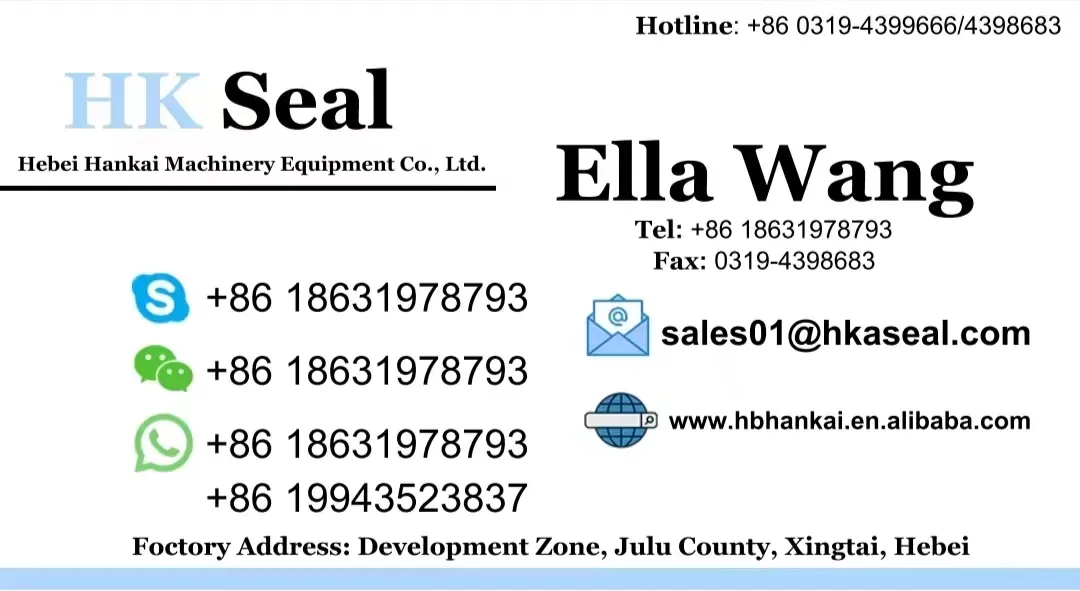Sep . 26, 2024 04:11 Back to list
high pressure pump seal
Understanding High Pressure Pump Seals Importance, Types, and Maintenance
High pressure pumps are vital components in numerous industrial processes, including oil and gas extraction, chemical processing, and water treatment. These pumps are subjected to extreme conditions, including high temperatures and pressures, which can cause significant wear and tear. One of the most critical components of a high-pressure pump is the seal, which plays a crucial role in ensuring efficiency and preventing leaks. This article explores the importance of high pressure pump seals, the various types available, and best practices for maintenance.
The Importance of Pump Seals
Seals in high pressure pumps serve several essential functions. Primarily, they prevent fluid leakage, ensuring that the pump operates efficiently without losing valuable resources. Fluid leaks not only lead to increased operational costs but can also pose environmental hazards, especially in industries dealing with corrosive or hazardous materials. Additionally, effective sealing helps maintain pressure within the pump, enhancing performance and reliability.
Moreover, seals protect the pump components from contaminants. In many applications, pumps move not just clean fluids but also media that may contain abrasive particles. Without a properly functioning seal, these particles could enter the pump and cause severe damage, leading to costly repairs and downtime.
Types of High Pressure Pump Seals
There are several types of seals used in high pressure pumps, each designed for specific applications and fluid types
1. Mechanical Seals These are widely used in high pressure applications due to their ability to provide a tight seal with minimal leakage. Mechanical seals consist of two primary components a stationary face and a rotating face. They are especially beneficial in applications involving high speeds and significant pressure fluctuations.
2. Packing Seals Also known as gland packing, these seals are made from flexible materials that can be compressed around the shaft of the pump. Packing seals are generally easier to install and replace, making them a popular choice for various industrial applications. However, they may require more frequent maintenance.
3. Lip Seals These seals are made from elastic materials and are designed to prevent fluid leakage while allowing some degree of shaft movement or misalignment. They are often used in applications where the working environment is less harsh.
4. O-rings O-rings are circular seals made from elastomers, used to provide sealing at the interface between two components. They can handle moderate pressure and are common in various pump designs. Their versatility and ease of installation make them a popular choice.
high pressure pump seal

5. Diaphragm Seals These seals separate the fluid from the environment using a flexible diaphragm. They are ideal for applications where contamination of the fluid must be avoided, such as in pharmaceutical or food processing industries.
Maintenance of High Pressure Pump Seals
Maintaining the integrity of pump seals is crucial to the overall performance of high pressure pumps. Regular inspection and replacement of worn-out seals can prevent costly repairs and downtime. Here are some best practices for seal maintenance
1. Routine Inspections Regularly inspect seals for signs of wear, such as cracks, tears, or deformation. Check for leakage around the seal area, which could indicate a failing seal.
2. Proper Installation Ensure that seals are correctly installed according to manufacturer specifications. Misalignment or improper installation can lead to premature failure.
3. Use Compatible Materials Choose seal materials that are compatible with the fluid being pumped, as some fluids can degrade certain seal materials over time.
4. Monitor Operating Conditions Keep track of temperature and pressure levels, as extreme conditions can affect seal performance. Adjusting operating conditions may extend the life of the seals.
5. Training and Awareness Train personnel on the importance of seals and their maintenance. Raising awareness can lead to better practices and reduced failure rates.
Conclusion
High pressure pump seals are fundamental to the efficiency and safety of industrial pumping systems. Understanding the different types of seals available and implementing proper maintenance practices is crucial for any business relying on high pressure pumps. By investing in the right seals and taking proactive measures, industries can enhance the durability and performance of their pumping systems, ultimately leading to safer and more cost-effective operations.
-
TCN Oil Seal Metal Ring Reinforcement for Heavy Machinery
NewsJul.25,2025
-
Rotary Lip Seal Spring-Loaded Design for High-Speed Applications
NewsJul.25,2025
-
Hydraulic Cylinder Seals Polyurethane Material for High-Impact Jobs
NewsJul.25,2025
-
High Pressure Oil Seal Polyurethane Coating Wear Resistance
NewsJul.25,2025
-
Dust Proof Seal Double Lip Design for Construction Equipment
NewsJul.25,2025
-
Hub Seal Polyurethane Wear Resistance in Agricultural Vehicles
NewsJul.25,2025
-
The Trans-formative Journey of Wheel Hub Oil Seals
NewsJun.06,2025
Products categories
















